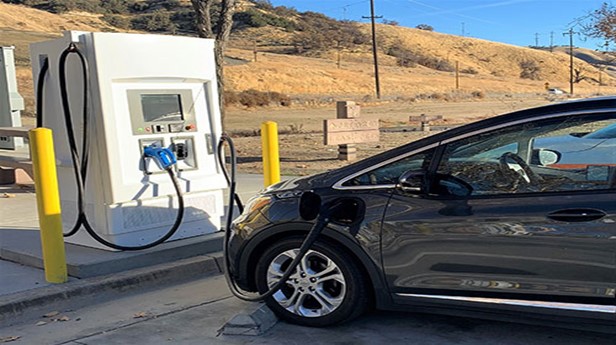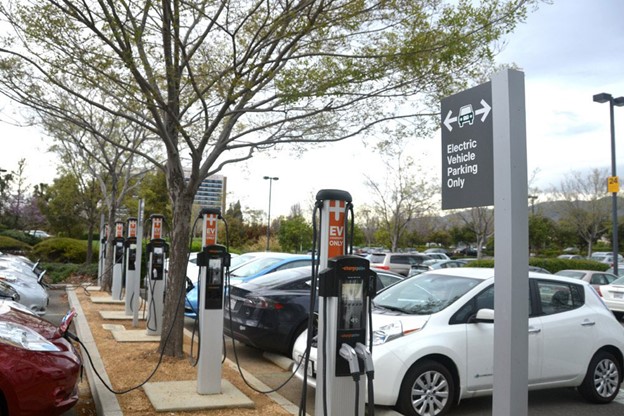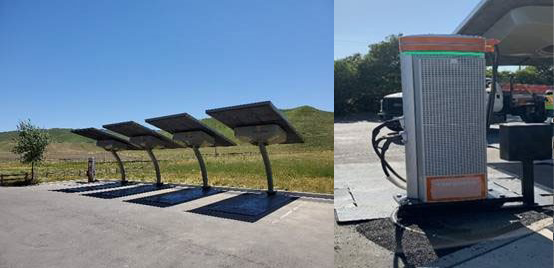
The electric vehicle Level 3 direct current chargers are available in nine locations across public highways in Central California
Photo Credit: California Department of Transportation (CALTRANs)
Project Name |
California Electric Vehicle Fast Chargers Along the State Highways, Central California |
|---|---|
Location |
Los Angeles, Ventura, Fresno, Kings, Madera, and Tulare counties |
Project Sponsor / Borrower |
California Department of Transportation |
Program Areas |
|
Value Capture Techniques |
Right-of-Way Use Agreements |
Mode |
Other: Electric Vehicles Chargers |
Description |
The California Department of Transportation (Caltrans) has added more fast-charging options along the state highways in Central California. The 22 new electric vehicle (EV) chargers span over nine locations in six counties. The Level 3 direct current (DC) fast chargers provide approximately 80 percent charge in 30 minutes to all EVs on the market with universal connectors, and enable free fast-charging capabilities with no time limit. They typically require 480V three-phase electrical power at the installation site, can restore up to 90 miles of range to an electric vehicle's plug-in battery in roughly 30 minutes, and can produce between 50 to 120 kilowatts per hour depending on the model. The project is supporting the private sector's goal to fill gaps in the zero-emission vehicle market. In September 2020, California’s cumulative zero-emission vehicle (ZEV) sales were 763,816, including nearly 59 percent battery-electric vehicles (BEVs), nearly 40 percent plug-in hybrid vehicles (PHEVs), and over one percent hydrogen fuel cell electric vehicles (FCEVs). California Governor Gavin Newsom's goal is to have 100 percent ZEV sales by 2035. More chargers throughout the State and alongside highways, combined with decreasing vehicle costs and increasing consumer acceptance, will help incentivize the purchase of EVs. The project also supports the Biden-Harris administration's executive order mandating the Federal Government buy ZEVs for its fleets. The executive order includes installing over 500,000 new EV charging stations across the country. The recent Transit Vehicle Innovation Deployment Center Advisory Panel Overview and Conclusions January 2021 report provides suggestions for expanding the adoption of zero-emission buses in the U.S. transit industry. The $4.5 million projects is funded by Caltrans and the San Joaquin Valley Air Pollution Control District in Fresno, California. The primary contractor is Cal Valley Construction of Fresno. The Broadband TelCom Power, Inc. of Santa Ana, California, provided and installed the DC EV Fast Chargers. The project also used subcontractors Civil Substations, Inc., Pacific Gas, and Electric, and Southern California Edison. Caltrans is researching a potential gas tax replacement as gas tax and other fuel tax revenues will no longer fund the infrastructure California needs as cars become more fuel-efficient. The potential gas tax replacement proposes a road charge where drivers pay to maintain the roads based on how much they drive instead of how much gas they purchase. Under this "user pays" system, all drivers share roadway maintenance and repair costs based on their use. |
Cost |
$4.5 million |
Funding Sources |
|
Project Delivery / Contract Method |
Design-Build |
Private Partner |
San Joaquin Valley Air Pollution Control District |
Project Advisors / Consultants |
|
Lenders |
N/A |
Duration / Status |
Completed in Jan 2021 |
Financial Status/Financial Performance |
Funded by Caltrans and the San Joaquin Valley Air Pollution Control District in Fresno |
Innovations |
|
Related Links / Articles |
|
Contacts |
Jim Medina Christian Lukens |

Caption: Electric Vehicle Direct Current (DC) fast charging stations dual-port fast chargers
Photo Credit: California Energy Commission

Caption: Solar-powered electric vehicle stations at Camp Roberts and Shandon Rest Areas
Photo Credit: California Department of Transportation (CALTRANs)